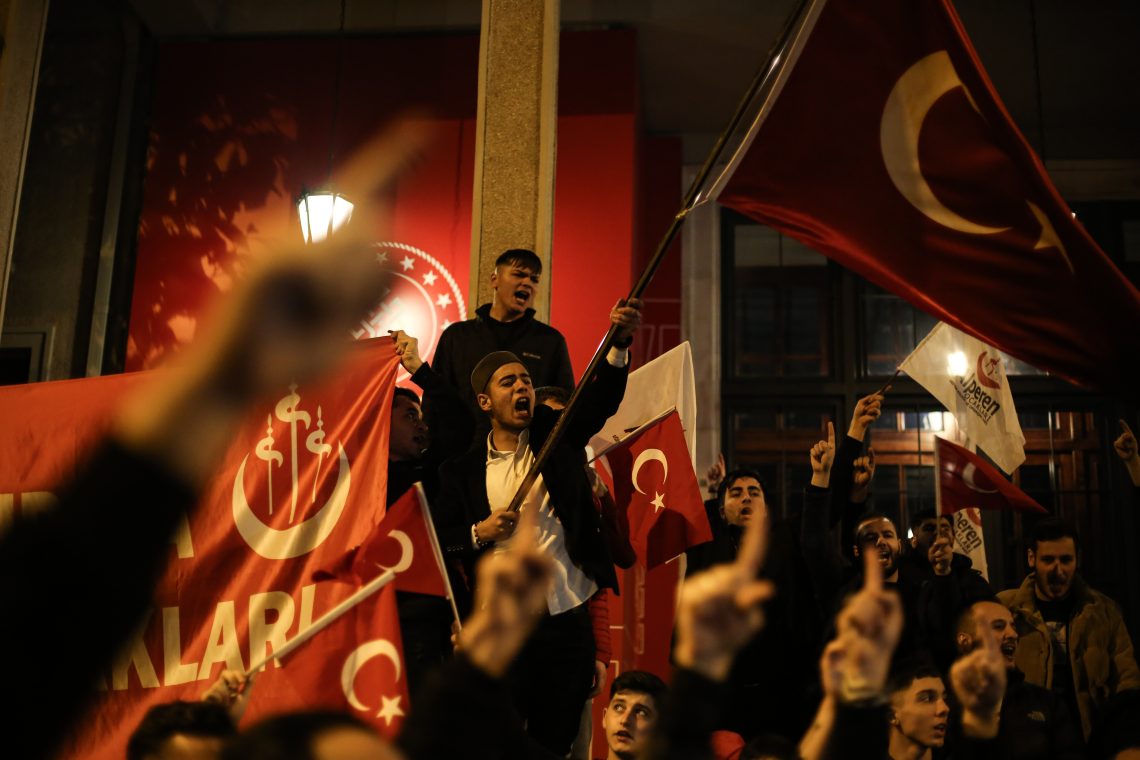Swedes may sink their own NATO bid
Turkey has valid concerns over Swedish ties with the terrorist PKK organization while domestic opposition also remains an obstacle to Stockholm’s application to join NATO.

In a nutshell
- Ankara’s complaints over Sweden’s NATO bid are grounded in fact
- President Recep Tayyip Erdogan may soften his opposition if he wins reelection
- The likeliest outcome remains Sweden joining NATO with Finland
On January 21, the Danish-Swedish right-wing politician Rasmus Paludan threw a big wrench into the works of Sweden’s application for membership in NATO. Having received permission from the police for a demonstration outside the Turkish Embassy in Stockholm, he gained international notoriety by burning a copy of the Quran.
The action triggered an uproar across the Muslim world, comparable in ferocity to the reactions in September 2005, when the Danish newspaper Jyllands-Posten published a set of cartoons of the Prophet Muhammad. Turkish President Recep Tayyip Erdogan reacted by proclaiming that Sweden should not count on Turkey to endorse its membership in NATO.
Taken aback, the Swedish government called a press conference where Prime Minister Ulf Kristersson, who took office in October 2022, adopted a somber look. He noted that membership in NATO is presently the key priority for Swedish national security and that nothing else comes even close. The prudent stance of the Swedish government has been to agree with its Turkish counterpart that under current circumstances further talks are pointless. The hope is that, once matters have cooled down, and after the May 14 presidential election in Turkey has taken place, matters will look different. President Erdogan may become more malleable if reelected. NATO may also be in a better position to put enough pressure on Ankara to resolve the situation by its upcoming summit in Vilnius in July. While 28 NATO countries have ratified the joint bid of Finland and Sweden to join the alliance, unanimity is required and thus far two holdouts remain – Turkey and Hungary.
Turkey has valid points
All may end well for NATO’s desire to have 32 members, but it is far from a sure thing. The reason why Sweden is in a more exposed position than Finland is that many of the complaints raised by the Turkish side are grounded in fact. Allegations that Sweden has become a haven for terrorists and organized crime figures with relations to terror organizations may not be easily dismissed, and the same goes for accusations that Swedish political and media elites on the left are permeated by sympathies for the Kurdish cause.
The incident with Mr. Paludan burning the Quran was preceded by several others explicitly designed to humiliate Turkey. Pro-Kurdish groups made public stunts that included members of parliament from the Left Party parading with flags of the terrorist organization, the Kurdistan Workers’ Party, known as the PKK, and a nightly video projection of a massive PKK image on Stockholm City Hall, which is prominently located on the waterfront. The projection was widely seen and circulated.
Anti-Turkish gestures reached a peak when an effigy of President Erdogan was hung upside down on a lamppost outside the City Hall. That same effigy was subsequently carried at the front of a pro-Kurdish rally marching through Stockholm.
The coming spring could feature a string of similar demonstrations, which may make it impossible for the Turkish parliament to vote in favor of Sweden joining NATO.
Read a related report by Stefan Hedlund
NATO’s Nordic bloc: Big promise, lurking problems
Finns willing to go it alone?
Such fears have also gained traction in Finland. On January 24, Finnish Foreign Minister Pekka Haavisto created a stir when he suggested to journalists that Finland might decide to decouple its application for membership from that of Sweden. The reaction in Stockholm was dismay, and NATO Secretary General Jens Stoltenberg felt compelled to reiterate his firm conviction that Finland and Sweden must join together.
Sensing a split between the two neighbors, President Erdogan opted to fan the flames by noting that the ratification of Finland may go ahead, leaving Sweden in shock to learn it was left out. In a second press conference, on January 30, Mr. Haavisto duly reconfirmed that the Finnish position remains to move forward in tandem with its neighbor. But serious doubts have been raised that will not be easy to assuage. A recent poll shows most Finns favor joining NATO without waiting for Sweden.
The case for joint entry remains strong
The case in favor of the two Scandinavian nations joining together does remain strong. Secretary General Stoltenberg has repeatedly emphasized that this is a priority, and support from the 28 NATO member states that gave speedy ratifications has been strong. The general understanding is that membership for both Finland and Sweden is essential for NATO planning on how to secure its northern flank. Even Turkey notes that it is in its own best security interests that NATO is enlarged.
Those who take an optimistic view also point at the tripartite agreement that was signed among Turkey, Finland and Sweden at the NATO summit in Madrid, clearing the way for Ankara to green-light the ratification process. Sweden claims it has been meticulous in honoring its commitments, and Turkey has admitted that progress has been made.
The main problem has not been the letter of the agreement but the fact that Mr. Erdogan has repeatedly upped the ante by publicly adding new demands, such as extradition of named people that according to Swedish law cannot be extradited. These shenanigans may be dismissed as part of his presidential reelection campaign. It does seem reasonable to expect that after the election they will be dialed back.

Sweden’s own doubts may derail its bid
What may still derail the process for joint approval is domestic Swedish opposition to NATO, which remains powerful.
While Finland spent its time following the collapse of the Soviet Union always looking for ways to tighten integration into Western political and security structures, Sweden opted to transform its long-standing belief in neutrality into a virulent projection of being a “moral superpower’’ that shuns military ways and always takes the high moral ground. Those causes have ranged from lavish foreign aid and left-wing regimes, as well as a welcoming attitude to migrants to a laid-back attitude to crime and punishment.
The combined outcome has been fourfold: a) creating a Kurdish diaspora of around 100,000 that, according to Ankara, is rife with PKK sympathizers, b) providing hundreds of millions of dollars in financial aid for northern Syria that Ankara says is funneled into the pockets of the People’s Defense Units (YPG), which is aligned with PKK, c) blocking legislation that might have required a harder stance on supporting and/or belonging to terrorist organizations, and d) failing to stop an explosion in organized crime that has funded terrorism.
Beyond these features, which are presently playing into the hands of the Turkish leader, the Swedish attitude of moral superiority has also nurtured a negative attitude to NATO. An important milestone was marked on March 5, when Swedish Prime Minister Magdalena Andersson, in office in 2021 and 2022, met with her counterpart Sanna Marin in Helsinki. It is hard to forget the glazed look on Ms. Marin’s face when Ms. Andersson explained that Swedish membership in NATO would destabilize the security situation in the Baltic region.
It was a predictable play, reflecting strong opposition to NATO across both the left and the center of the Swedish political spectrum. Only the liberals have been in favor, with the conservatives being reluctant to take a stand. Even in the run-up to the Russian invasion of Ukraine, the Swedish government remained averse to seeking membership. Defense Minister Peter Hultquist made clear that he was a staunch opponent, claiming that it would never happen on his watch.
When Finnish President Sauli Niinisto met U.S. President Joe Biden in the White House to discuss how to proceed with a Finnish membership application, the American leader made an unprecedented telephone call to the Swedish prime minister, presumably to enlist support for a joint application. As evidenced by Ms. Andersson’s appearance in Helsinki only days later, that message was not taken to heart. Faced with a massive backlash, not the least in parts of the Finnish media, the reaction in Stockholm was swift. The Foreign Office official who had written the speech for Ms. Andersson was transferred while the prime minister’s office took over control of the issue. For good measure, Ambassador Oscar Stenstrom was recalled from the Swedish Embassy in Chile to manage the process. A long-standing Social Democrat, he was an odd man out, having been staunchly in favor of joining NATO.
Following national elections last September, the Social Democrats lost power and a new coalition government was formed that took a staunchly pro-NATO stance. It also retained Mr. Stenstrom as lead negotiator, despite him being a Social Democrat. For some time, it looked like matters were well on track. Prime Minister Kristersson visited Ankara and officials were ticking off commitments in the tripartite agreement. Then the roof caved in.
Can Swedes persuade anti-NATO activists?
The question looking forward now concerns not the specifics but rather the optics. Will the Swedish government be able to dissuade various activists from pouring more gasoline on the fire, or will such activism escalate out of control? Continued rallies in favor of the Kurds may still be manageable, as well as more rallies against Sweden joining NATO. A far greater threat emanates from the fact that the Social Democrats have decided to use the crisis to undermine the government.
In a meeting with parliamentary party leaders on January 31, Mr. Kristersson appealed to all to show maximum calm and to avoid raising the stakes. Reports were presented about substantial damage to Swedish interests abroad and about Russian state actors being involved in fanning the flames. The response from former Prime Minister Andersson was to attack the government for relying on the Sweden Democrat Party, which she accused of being a pro-Russian security risk.
Her gamble is logical. Ever since the Social Democrats won power in 2014, they have been faced with a nonsocialist majority in parliament. Their way to preserving power has been to demonize the Sweden Democrats, which is currently supported by around a fifth of the electorate. By relentlessly branding it as racist, fascist and worse, other parties have feared any form of association. That gridlock broke after the national elections in September 2022. The present nonsocialist government made a deal with the Sweden Democrats that secures a parliamentary majority.
The NATO crisis offers a golden opportunity to break that deal. The focus of the attack is the chairman of the parliament’s judiciary committee, Richard Jomshof, who is a prominent member of the Sweden Democrats. His reaction to the burning of the Quran was to claim that freedom of speech is more important than appeasing President Erdogan.
Upping the ante, the leader of the Sweden Democrats, Jimmie Akesson, responded to the attack from Ms. Andersson by accusing her of being in bed with the PKK. She had secured her appointment as prime minister via a deal with a Kurdish member of parliament, a renegade former member of the Left Party, Amineh Kakabaveh. In return for substantial Swedish aid to the YPG, Ms. Kakabaveh cast her swing vote for Ms. Andersson.
Scenarios
This open mudslinging may trigger such a crisis within the government that it essentially collapses. If this in turn results in Sweden being denied membership in NATO, then Ms. Andersson can always fall back on the realization that the bulk of her own support is drawn from circles that feel it was a huge mistake to apply for membership in the first place.
The most likely outcome remains that Sweden will join when the time comes for NATO to decide how much pressure to apply on President Erdogan. Membership in NATO for Sweden remains essential – if only it could be without the troublesome Swedes.




